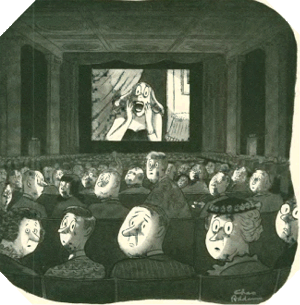 |
| sallow, queer, sagacious visage |
"The whole physiognomy is as coarse a one as you would meet anywhere in the length and breadth of the States; but, withal, it is redeemed, illuminated, softened, and brightened by a kindly though serious look out of his eyes, and an expression of homely sagacity, that seems weighted with rich results of village experience. A great deal of native sense; no bookish cultivation, no refinement; honest at heart, and thoroughly so, and yet, in some sort, sly,—at least endowed with a sort of tact and wisdom that are akin to craft, and would impel him, I think, to take an antagonist in flank, rather than to make a bull-run at him right in front. But, on the whole, I like this sallow, queer, sagacious visage, with the homely human sympathies that warmed it; and, for my small share in the matter, would as lief have Uncle Abe for a ruler as any man whom it would have been practicable to put in his place."
... Nathaniel Hawthorne (1804-64), american author, descibing Abraham Lincoln (1809-65) after meeting him at the White House in the midst of the Civil War (1862)



Hawthorne was buried on what is now known as "Authors' Ridge" in Sleepy Hollow Cemetery, Concord, Massachusetts. Pallbearers included Longfellow, Emerson, Holmes, Alcott, James Thomas Fields, and Edwin Percy Whipple. Emerson wrote of the funeral: "I thought there was a tragic element in the event, that might be more fully rendered,—in the painful solitude of the man, which, I suppose, could no longer be endured, & he died of it."
ReplyDeleteEvery day of my life makes me feel more and more how seldom a fact is
ReplyDeleteaccurately stated; how, almost invariably, when a story has passed through
the mind of a third person, it becomes so far as regards the impression
that it makes in further repetitions, little better than a falsehood, and
this, too, though the narrator be the most truth-seeking person in
existence. How marvelous the tendency is! ... In truth a fantasy which we
are to pursue forever and never grasp? ... This is May-day! Alas, what a
difference between the ideal and the real!
I read Hawthorne's biography a few years ago and was disappointed to read about what a racist he and his wife were. In one chapter, they attended a dinner party where there was a guest of African ancestry, a free person and educated. The passage goes on to say that the Hawthornes were appalled to have to sit down at a table with this person, that they refused to speak to the guest and Mrs. Hawthorne commented later that she felt insulted to have to dine with this person, she made some catty comment on how the person "stunk". I'm not surprised that he would write something like "Chiefly about War Matters". He could not fathom the idea of white men dying to free black people. I had always admired Hawthorne up to that point, I feel differently about him now.
ReplyDelete